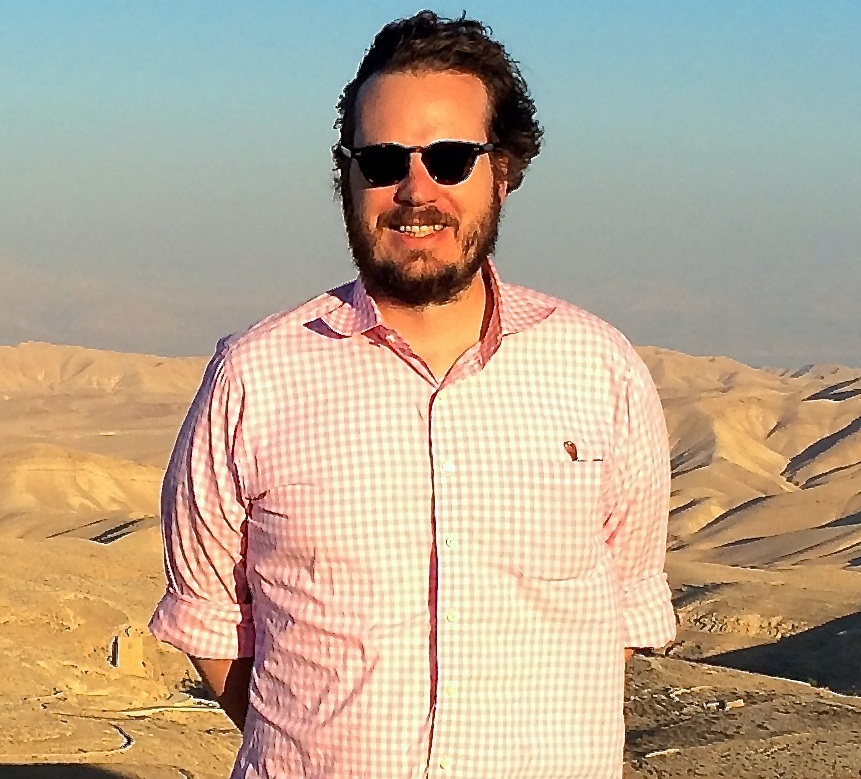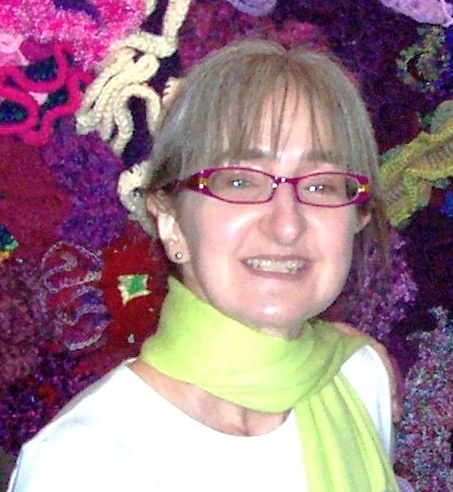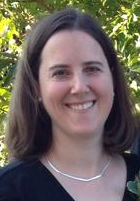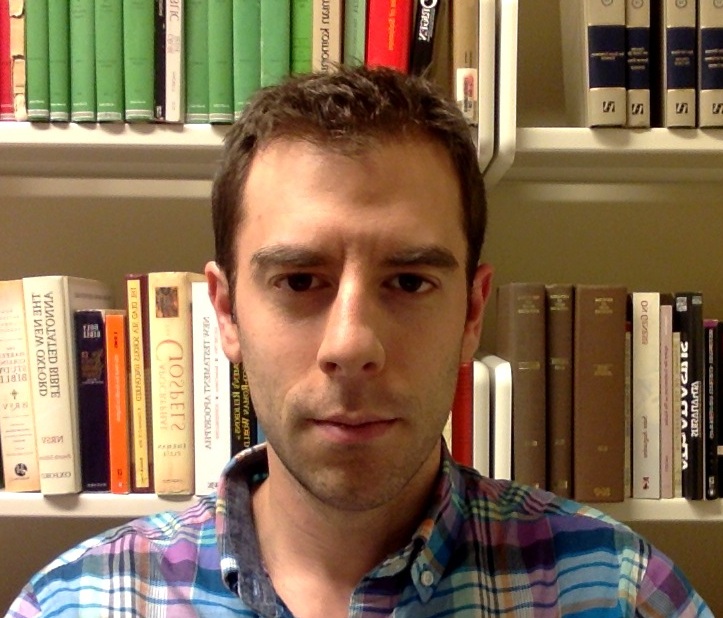Rev. Vasilije Vranic, Ph.D.
Fr. Vranic is a priest of St. Luke Serbian Orthodox Church, Potomac MD. He is the author of The Constancy and Development in the Christology of Theodoret of Cyrrhus. Vigiliae Christianae suppl. 129 (Leiden: Brill, 2015). His current research focuses on the connection between Christology and the concept of Theosis.
Some Previous Visitors
Johanna Schenk
Johanna Schenk is a research assistant at the Department of Classical Philology at the Catholic University of Eichstätt-Ingolstadt, Germany, where she studied Latin and Mathematics from 2008 to 2014. Currently she is working on her Ph.D. thesis on the letters of Avitus of Vienne: "Die Briefe des Avitus of Vienne. Inszenierungen eines spätantiken Bischofs."
 Christian Hornung
Christian Hornung
Christian Hornung is a Heisenberg Fellow of the German Research Foundation (DFG) at the Department of Catholic Theology, University of Siegen. He studied Catholic theology, Latin, and German philology at the universities of Bonn and Vienna (2003-2007). From 2007 to 2010 he worked as assistant at the University of Bonn (Chair for the History of the Early Church), and following that served until 2015 as Deputy Director of the F. J. Dölger Institut in Bonn. He has held lectureships at the universities of Münster, Cologne, and Erfurt. Awarded the Pax-Bank-Förderpreis, his dissertation examines the episcopate of the Roman bishop Siricius and the rise of the papacy at the end of the fourth and beginning of the fifth century (Directa ad decessorem: Ein kirchenhistorisch-philologischer Kommentar zur ersten Dekretale des Siricus von Rom, Münster, 2011). His Habilitation (Apostasie im antiken Christentum: Studien zum Glaubensabfall in altkirchlicher Theologie, Disziplin und Pastoral) is forthcoming in Supplements toVigiliae Christianae. Dr. Hornung's research interests are focused on the social and legal history of late antique Christianity. His current project examines the asceticism of the clergy from the fourth century onwards.
 Audrey Becker
Audrey Becker
Audrey Becker is Maître de conférences en Histoire romaine at the University of Lorraine, France. She completed her Ph.D. in Ancient History at the University of Strasbourg in 2006. Her research focuses on imperial power from Constantine to Justinian and on social sciences as applied to late antiquity. Her publications include Les relations diplomatiques romano-barbares en Occident: Acteurs, fonctions, modalités (Paris: De Boccard, 2013) and numerous articles about the diplomatic relations between Rome and Barbarian kingdoms in late antiquity. She co-edited with N. Drocourt a volume on Ambassadeurs et ambassades au cœur des relations diplomatiques: Rome, Occident Médiéval, Byzance (Metz: Crulh, 2012). Her most recent book, Dieu, le souverain et la cour Stratégies et rituels de légitimation du pouvoir impérial et royal dans l’Antiquité tardive et au haut Moyen Âge (2022), was published in the series Scripta Antiqua by the University of Bordeaux.
 Scott Johnson
Scott Johnson
 Wendy E. Mayer
Wendy E. Mayer
Wendy Mayer, formerly Deputy Director of the Centre for Early Christian Studies at the Australian Catholic University, is now a Research Fellow there. She has also been a Queen Elizabeth II Research Fellow, a Research Fellow at Dumbarton Oaks, and Distinguished Visiting Professor in Biblical and Ancient Studies at University of South Africa. Now resident in the Washington DC area, she is a regular visitor to our Center. She is currently co-editing with Professor Rousseau a volume of essays entitled Change in the Late Roman City: Identities, Buildings, and Beliefs, which explores the extent to which "city life" worked as an engine of change at a time when established orders were either threatened or challenged.
She received her doctorate from the University of Queensland. Author of the major 2005 monograph The Homilies of John Chrysostom: Provenance (with a second volume to come), co-author or editor of ten other books, author of more than 50 articles and book chapters, and recipient (sometimes jointly) of research grants totaling more than 1 million Australian dollars, she is now recognized as one of the world's leading authorities on the life and writings of John Chrysostom. In addition to her John Chrysostom: The Deconstruction of a Saint (in progress), her most important forthcoming work is probably that devoted to John's correspondence, to appear in P. Allen and B. Neil (eds), Collecting Early Christian Letters (Cambridge: Cambridge University Press, 2015). Other recent publications include "Mania and Madness in the Works of John Chrysostom," in H. Perdicoyianni-Paleologou (ed.), The Concept of Madness from Homer to Byzantium (Amsterdam: Hakkert, forthcoming), and "Medicine in Transition: Christian Adaptation in the Later Fourth-Century East," in G. Greatrex and H. Elton (eds), Shifting Genres in Late Antiquity (Farnham: Ashgate, forthcoming), reflecting her growing interest in the relation between Greek medical science and ethical theory. Religious conflict in both past and present is another emerging strand in her research, on which she has recently published two articles in the volume Religious Conflict from Early Christianity to the Rise of Islam (co-edited with Bronwen Neil, Berlin: De Gruyter, 2013), and "Theorizing Religious Conflict: From Early Christianity to Late Antiquity and Beyond" (Journal of Early Christian History, forthcoming).
 Rebecca Rine
Rebecca Rine
Rebecca Rine holds a Ph.D. in Religious Studies from the University of Virginia, an M.A. in Applied Linguistics from the University of North Carolina at Charlotte, and a B.A. in English with minors in Spanish and Music from Campbell University (NC). Her interest in ancient and contemporary literary culture have led her into research projects on ancient canon lists; cognitive linguistic theory and the use of imagery in Ignatius' "Letters"; representation of the figures of Abraham and Moses in ancient Jewish and Christian discourse; and patterns of biblical quotation in patristic literature. Dr. Rine's dissertation, The Song of Songs as Scripture and Script: Performance, Pedagogy, Patristics, examines patristic quotation of the Song of Songs in light of performative theories of language and ancient pedagogical practice. Her current research focuses on the intersection of modern linguistics and the ancient commentary tradition, in particular the works of Origen, Gregory of Nyssa, and Theodoret of Cyrus.
 Karl Shuve
Karl Shuve
Karl Shuve is Assistant Professor of Religious Studies at the University of Virginia. He received his BA and MA degrees from McMaster University and his PhD from the University of Edinburgh. He is broadly interested in questions of identity and authority in the world of Late Antiquity, particularly as they intersect with the interpretation of sacred texts. He has recently completed his first book, The Song of Songs and the Fashioning of Identity in Early Latin Christianity (under review), which explores the emergence of ascetic readings of the Song in the Western Roman Empire. Following on from this research, he is beginning a book project on the use and development of the nuptial metaphor (the identification of the church/soul/virgin as the bride of Christ) in late antique Christianity, which focuses especially on theoretical issues pertaining to the representation of women in literature and art.
Georgia Frank
Georgia Frank is Professor of Religion at Colgate University In Hamilton, NY. She received her BA from Barnard College, an MTS from Columbia, and her PhD from Harvard. She has also taught at Holy Cross College. She has received numerous fellowships from such sources as the NEH, the ACLS, the AAUW and the Mellon Foundation, including a summer fellowship at the American Academy in Rome.
Robert Wisniewski
Robert Wisniewski teaches at the Institute of History at the University of Warsaw, where he gained his Ph.D. in 2002 with a thesis entitled "Satan and his Servants: the Devil and Demons in Early Latin Hagiography." He has held fellowships in Paris (a Batory Foundation Fellowship at the Sorbonne's Centre Lenain de Tillemont and a Foundation for Polish Science Fellowship at the Centre d'Histoire et Civilisation de Byzance at the Collège de France) and at the Augustinianum in Rome (a Lanckoronski Foundation Fellowship).
Sophie Lunn-Rockliffe
Sophie Lunn-Rockliffe is Senior Lecturer in Roman History in the Department of Classics at King's College, London. She gained a degree in history at Oxford University in 1998 and completed her doctorate at Cambridge University in 2004. Before going to King's in 2007, she had held a Leverhulme Studentship in Rome (2001-2), a Research Fellowship at Peterhouse, Cambridge (2002-4), and a College Lectureship in History at the same college (2004-6), followed by a Fellowship at the Italian Academy at Columbia University (2006).
Ellen Muehlberger
Ellen Muehlberger is Assistant Professor in the Departments of History and of Near Eastern Studies in the University of Michigan at Ann Arbor. Having graduated in Comparative Religion and Biomedical Sciences at Western Michigan University in 1995, she completed her graduate degrees in Religious Studies at Indiana University in Bloomington, gaining her doctorate there in 2008. While a doctoral student, she served as Editorial Assistant on the Journal of Early Christian Studies.
Laura Nasrallah
Laura Nasrallah is Professor of New Testament and Early Christianity at Harvard Divinity School. After graduating from Princeton, she completed a master's degree and a doctorate in divinity at Harvard. She combines her New Testament scholarship with keen attention to both early Christian literature and Mediterranean archaeology.
AnneMarie Luijendijk
After specialist work on the New Testament at the Vrije Universiteit, Amsterdam, AnneMarie Luijendijk completed her doctorate at The Harvard Divinity School in 2005. She joined the Princeton faculty in 2006. Having won an American Fellowship from the American Association of University Women for the 2008-2009 academic year, she was appointed Melancthon W. Jacobus University Preceptor in Religion (2009-2012). She is now an Associate-Professor in the Department of Religion.
Albrecht Diem
Albrecht Diem has been, since 2007, Assistant Professor in the Department of History at Syracuse University. After studying in Düsseldorf, Tübingen and Utrecht, he gained his doctorate at the last university in 2000, his thesis being subsequently published as Das Monastische Experiment: Die Rolle der Keuschheit bei der Entstehung des westlichen Klosterwesens, Vita Regularis, 24 (Münster: LIT-Verlag, 2005). (His most recent consideration of the theme has appeared as "Das Ende des monastischen Experiments: Liebe, Beichte und Schweigen in der Regula cuiusdam ad virgines," in Gert Melville and Anne Müller (eds), Female vita religiosa between Late Antiquity and the High Middle Ages: Structures, Developments and Spatial Contexts (Münster: LIT-Verlag 2011), pp. 81-136.)
Yifat Monnickendam (Visiting Scholar, 2009, 2010-2012)
Yifat Monnickendam recently held a Crane Post-Doctoral Fellowship at Johns Hopkins University, teaching in that university's Jewish Studies Program (she specializes in the comparative study of Hebrew, Aramaic, Syriac, Greek, and Latin sources in Late Antiquity). After receiving a BA and MA from the Hebrew University in Jerusalem, she completed her doctorate at Bar Ilan University. She was awarded at that time the Rotenstreich Fellowship, one of the most prestigious awards granted by the Council of Higher Education to doctoral students in Israel.
Megan Hale Williams
After completing bachelor's degrees in both Classics and Biology at Stanford University, Megan Williams completed a doctorate at Princeton University under Peter Brown. She is the author of The Monk and the Book: Jerome and the Making of Christian Scholarship (Chicago, 2006) and (with Anthony Grafton) Christianity and the Transformation of the Book: Origen, Eusebius, and the Library of Caesarea (Harvard, 2006).
Chrysi Kotsifou
Chrysi Kotsifou gained her doctorate in 2002, after undergraduate and graduate research at Goldsmith's and King's Colleges, University of London. She has held post-doctoral fellowships at CUA, Princeton, the American University in Cairo, and Columbia, and has taught at the American University in Cairo. She was granted a two-year teaching and research fellowship in the Center, combined with an appointment as visiting associate curator in the Semitics/ICOR Library, supported by funds from the Center, the Institute of Christian Oriental Research, and the Dean of the School of Arts and Sciences.
Karl Johan Skeidsvoll (2006-2007) Research Fellow at the University of Bergen, continued his research on Gregory of Nazianzus.
Caroline Schroeder (Spring 2006), at that time Fellow in the Humanities at Stanford University. She is currently Assistant Professor of Religious and Classical Studies at the University of the Pacific at Stockton, CA. She published Monastic Bodies: Discipline and Salvation in Shenoute of Atripe (University of Pennsylvania Press, 2007), and received the 2010-2011 Graves Award for outstanding teaching in the humanities.
Lewis Ayres (Spring 2005), at that time on the faculty of the Candler School of Theology, Emory University. He is currently Bede Professor of Catholic Theology in the Department of Theology and Religion at the University of Durham. Professor Ayres is a member of the International Editorial Board of our series "CUA Studies in Early Christianity." He is author of Nicaea and Its Legacy (Oxford University Press, 2004) and of Augustine and the Trinity (Cambridge University Press, 2010).
